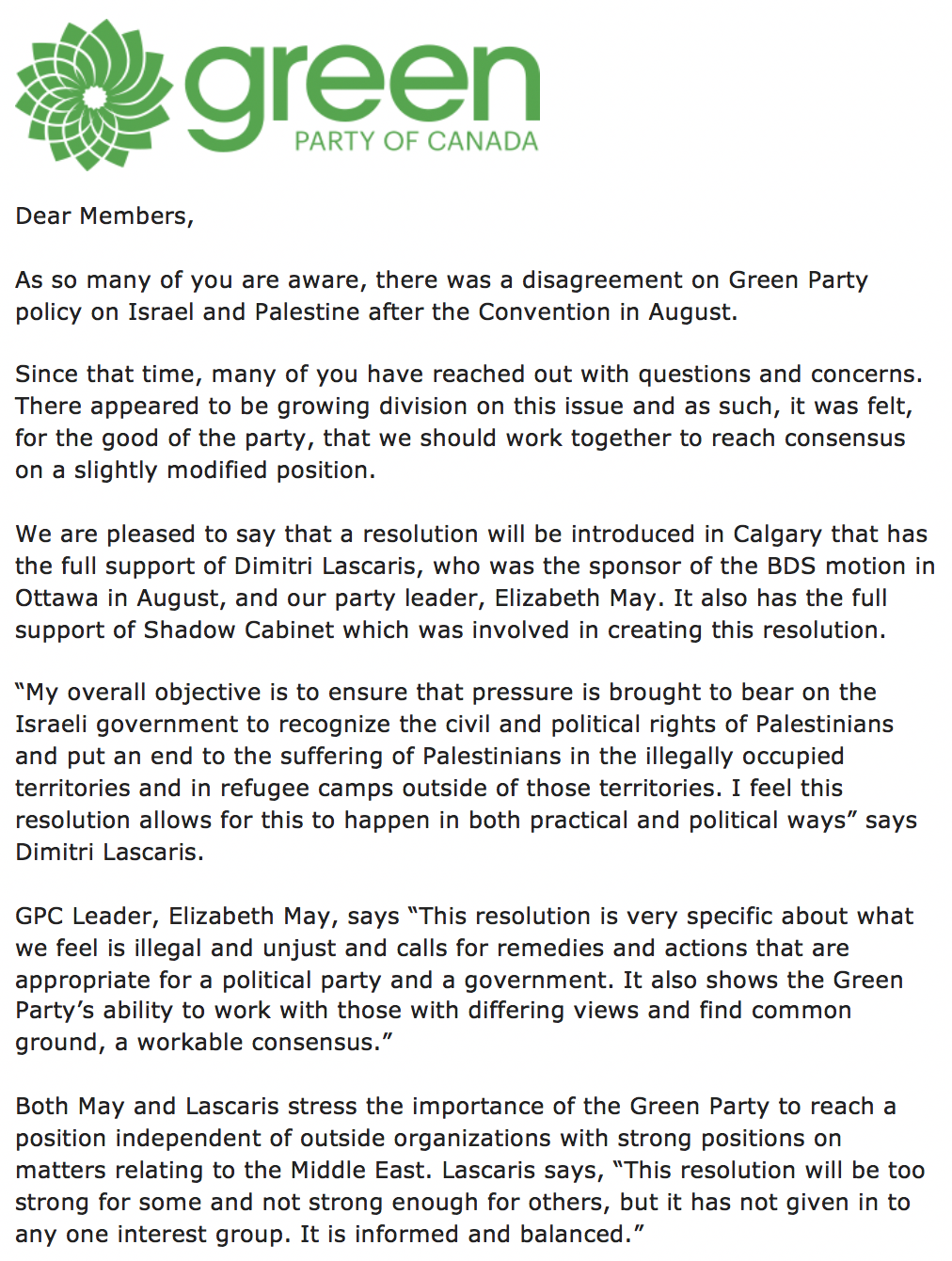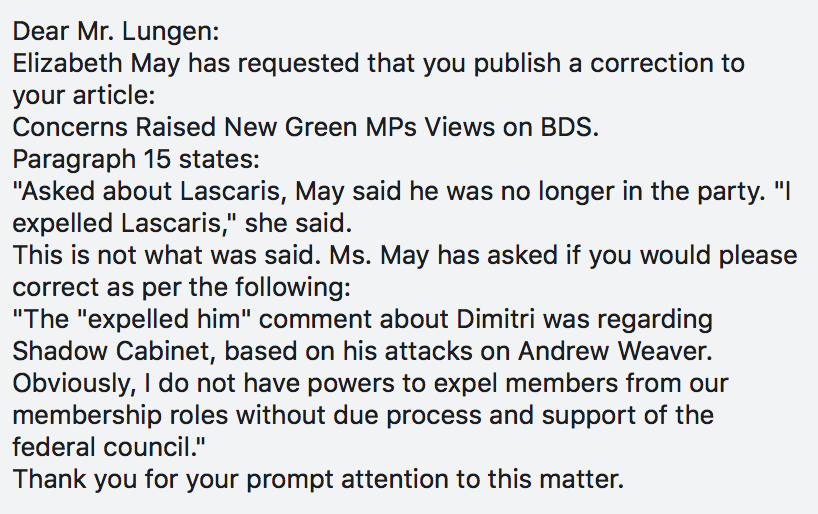On May 6, 2019, Paul Manly of the Green Party of Canada won a historic byelection in the B.C. riding of Nanaimo-Ladysmith. For the first time in over 35 years of existence, the Green Party will now have two MPs who both won their seats under the Green Party banner.
The other Green MP is, of course, Green Party leader Elizabeth May.
Paul is the son of former NDP MP Jim Manly. In 2015, before joining the Green Party, Paul sought the NDP nomination in the same riding, but the NDP, then led by Tom Mulcair, shamefully blocked Paul’s nomination.
At the time, Paul revealed that the rejection of his candidacy was related to Israel/Palestine:
I was told verbally on the phone, that the reason was in relation to what I said and did when my father was in Israel. There was also concern that I was running to make Israel and Palestine an election issue.
In 2012, Paul’s father Jim was arrested by Israeli authorities for trying to break peacefully through Israel’s inhumane blockade of Gaza. Jim was released a few days later.
The Zionist Lobby’s Attacks On Paul Manly Have Already Begun
In light of Paul’s history, it is all-too-predictable that the Zionist lobby began attacking Paul within days of his victory.
On May 10, 2019, Canadian Jewish News (CJN) published an article entitled “Concerns Raised Over New Green MP’s Views On BDS.” The concerns, of course, were those of the usual pro-Israel suspects: the Centre for Israel and Jewish Affairs (CIJA), B’nai Brith Canada and the Friends of Simon Wiesenthal Centre (FSWC).
Leading the charge was CIJA CEO Simon Fogel, who thundered that “The Green party has been co-opted by extreme activists who – in their obsessive campaign of prejudice against Israelis – threaten the party’s own credibility and relevance in Canadian politics.”
The CJN article is rife with hyperbole, falsehoods and distortions, but my purpose in writing this post is not to address the invective from the usual suspects. Rather, my purpose is to expose the misinformation emanating from Elizabeth May.
The CJN article reported that Elizabeth May gave a telephone interview to CJN staff reporter Paul Lungen. After that interview, Lungen attributed to Elizabeth May various statements that are false or, at a minimum, highly misleading.
May’s false and misleading statements are contained in the following passages from CJN‘s article.
In a telephone interview from Ottawa, Green Party Leader Elizabeth May said the party repealed the August 2016 pro-BDS resolution in December of that year. It spent $100,000 and went to great lengths to reconvene a larger gathering of the party, in order to do so.
“We have nothing to do with BDS,” May said. “We repealed it. We are not a party that condones BDS. We would never tolerate anybody in our party who violates our core values, who are anti-Semitic.”
************************
Asked about Lascaris, May said he was no longer in the party. “I expelled Dimitri Lascaris,” she said.
************************
May pointed to Vision Green, the Green party’s platform on a number of issues, including the Israeli-Palestinian dispute.
In it, the party endorses Israel’s right to exist, calls for an end to violence and says the Green party will “Accurately label products so that consumers can differentiate between products of Israel and those of disputed areas,” and “Amend the Canada-Israel Free Trade pact to allow for product differentiation.”
It also calls for “an end to the collective siege of Gaza so that medical and humanitarian aid can be provided,” and urges “Israel to stop expansion and the building of illegal settlements beyond the 1967 borders.”
Before I unpack these falsehoods and misleading statements, it is important to recall the history of this matter.
The Green Party’s BDS Resolution
I had the privilege of working with Paul Manly in 2016, when I served briefly as Justice Critic in the Green Party shadow cabinet.
(In the interests of full disclosure, I donated $400 to Paul’s recent electoral campaign.)
My seven months in the Green Party of Canada’s shadow cabinet were tumultuous, to put it mildly.
Shortly after Elizabeth May invited me to join shadow cabinet, I travelled to Israel and the West Bank for the fourth time in my life. There, I witnessed the daily oppression under which Palestinians are forced to live. Their current plight seemed to me to be worse than ever.
That experience left an indelible impression upon me, and moved me to bring forward a Green Party resolution calling for the party to support the use of boycotts, divestment and sanctions to bring an end to Israeli settlement construction in the West Bank and to induce Israel to negotiate a just and sustainable two-state solution with the Palestinian people.
This was the full text of my proposed resolution:

Contrary to claims that were made at the time, my proposed resolution was not an endorsement of the BDS Movement. In fact, the resolution made no reference to the BDS Movement. More importantly, and as I explain more fully below, the BDS Movement has three fundamental goals. My resolution addressed only one of those goals: ending Israel’s occupation of and settlements in the Palestinian territories of the West Bank, including East Jerusalem, and Gaza.
After deciding to bring forward the BDS resolution, I soon learned that Elizabeth May was opposed to BDS. In good conscience, however, I could not withdraw the resolution after what I had seen in Palestine. I decided to persevere despite May’s opposition, expecting fully that I would lose in the end, but that I would at least draw attention to the immense suffering of Palestinians.
To my considerable surprise, at the party’s biannual convention in August 2016, a large majority of the members in attendance voted in favour of the resolution over the objections of Elizabeth May.
Within days of that unexpected victory for human rights, Elizabeth May threatened to resign as Green Party leader.
Under intense pressure, the party’s Federal Council hastily organized a special meeting of the party’s members, the primary purpose of which was, without doubt, to engineer a repeal of the BDS resolution.
I and the dozens of other Green Party members who had worked tirelessly to secure the resolution’s adoption decided to resist.
At that stage, the party was threatened by a divisive battle.
The New Green Party Resolution on Israel / Palestine
In order to avoid lasting damage to party unity, Paul Manly and another shadow cabinet member, Jo-Ann Roberts, were appointed to lead negotiations between those who wished to preserve the resolution and those who wished to secure its repeal. The objective was to find a compromise that everyone could live with. I was one of three shadow cabinet members who led the negotiations on behalf of those who wished to preserve the BDS resolution.
Thanks in no small part to the admirable efforts of Paul and Jo-Ann, a compromise resolution was agreed to by the main negotiators in November 2016, a few weeks prior to the special meeting Federal Council had hastily called after Elizabeth May’s threat of resignation.
At the time that an agreement was reached, Paul and Jo-Ann issued this statement to Green Party members announcing the successful conclusion of the negotiations:

That statement to party members was unambiguous in declaring that the new resolution had Elizabeth May’s “full support.”
The new resolution was presented to the members at a special meeting held in Calgary in December 2016. It was adopted with the support of 84% of the members present at the special meeting. A month later, it was ratified by 91% of Green Party members who voted in an online vote.
Does the Green Party of Canada Now Support BDS?
It is true that the new resolution (the full text of which can be examined at the end of this article) omitted the dreaded acronym “BDS”, but it is equally true that the new resolution went much further than the original BDS resolution.
First, the new resolution explicitly endorsed not one but all three of the goals of BDS Movement. Those goals are stated clearly on the website of the BDS Movement. They are stated to be as follows:
- Ending Israel’s occupation and colonization of all Arab lands and dismantling the Wall;
- Recognizing the fundamental rights of the Arab-Palestinian citizens of Israel to full equality; and
- Respecting, protecting and promoting the rights of Palestinian refugees to return to their homes and properties as stipulated in UN Resolution 194.
Now let’s compare these stated goals to the following passages from the Green Party’s new resolution on Israel / Palestine.

Resolution 194 was adopted by the U.N. General Assembly in the 1940s. It provides that:
refugees wishing to return to their homes and live at peace with their neighbours should be permitted to do so at the earliest practicable date, and that compensation should be paid for the property of those choosing not to return and for loss of or damage to property which, under principles of international law or equity, should be made good by the Governments or authorities responsible.
It is thus clear that the Green Party’s new resolution on Israel / Palestine endorsed all three goals of the BDS Movement: the right of Palestinian refugees to return to their homeland; full equality for Palestinians living in Israel; and an end to the settlements and the occupation of Palestinian Territories.
The same is true of the tactics of the BDS Movement: the Green Party’s new resolution on Israel / Palestine endorsed the BDS Movement’s tactics of boycotts, divestment and sanctions, as is clear from this passage (among others):

Not only did the new resolution endorse in broad terms the three core tactics of the BDS Movement, but it also did something else that the original resolution did not do: it explicitly called for specific types of sanctions to be imposed upon Israel, namely, an arms embargo and a ban on the importation into Canada of products from Israel’s illegal settlements.
One other respect in which the new resolution surpassed the original is that the new resolution called on the Government of Canada to ask the International Criminal Court (ICC) to prioritize its investigation into charges of potential war crimes by members of the Israeli forces. The original resolution made no reference to the ICC or to the commission of war crimes by Israeli forces.
What Is A Movement?
At the end of the day, a movement is defined essentially by its goals and tactics.
The Green Party’s new resolution on Israel / Palestine unequivocally embraced goals and tactics that are indistinguishable from those of the BDS Movement.
Elizabeth May is reported to have told the CJN that “We have nothing to do with BDS. We repealed it. We are not a party that condones BDS.”
Those claims are false, and undeniably so.
This is not the first time that the Green Party leadership has misled the public about the new resolution. From the moment that the new resolution was adopted in Calgary, the Green Party apparatus has issued statements that have deceived the media and the public about the true nature of the party’s support for BDS.
For example, within hours of the completion of the Calgary meeting, the party issued a press release – without my consent or foreknowledge – declaring that we had “rejected the goals of the BDS movement.” This was a gross falsehood about which I and others complained vigorously at the time. Those complaints led to a modification of the GPC’s statement about the new resolution, but not before the party’s original statement caused the media to issue false reports about the resolution, such as this one:

Finally, in her comments to the CJN, Elizabeth May reportedly talked about statements made within Vision Green about Israel and Palestine. It is important to understand that Vision Green is not a comprehensive compilation of the member-approved policies of the party, although it is certainly influenced by member-approved policies. The leader of the party exercises vast control over the content of Vision Green. In important respects – and this is certainly true with regard to Israel and Palestine – Vision Green is akin to a marketing document; it represents the leader’s preferred messaging rather than the policies adopted by the members to whom the leader is purportedly answerable.
Are The Thousands of Greens Who Support BDS Anti-Semites?
The CJN article attributes to Elizabeth May the following comments:
We are not a party that condones BDS. We would never tolerate anybody in our party who violates our core values, who are anti-Semitic.
Assuming she spoke these words, Elizabeth May appears to have implied to the CJN that supporters of BDS – a movement endorsed by progressive Jewish groups around the world, including Independent Jewish Voices Canada and Jewish Voice for Peace – are anti-Semites.
Not even the Canadian Parliament’s anti-BDS resolution, adopted in February 2016, went so far as to accuse BDS supporters of being anti-Semites.
Notably, Elizabeth May was absent from Parliament when the vote on Parliament’s anti-BDS resolution was held.
By contrast, current NDP leader Jagmeet Singh (whose unwillingness to endorse sanctions on Israel I have previously discussed) spoke vigorously against a similar resolution brought forward in Ontario’s legislature when he was an Ontario MPP.
Did Elizabeth May Expel Me From The Green Party Of Canada?
The CJN reported that Elizabeth May expelled me from the Green Party.

That too is false.
In September 2016, Elizabeth May did expel me from the Green Party shadow cabinet after I refused her demand that I apologize to B.C. Green Party leader Andrew Weaver for responding critically to his attacks on BDS supporters.
May did not, however, expel me from the party, nor has she the authority to do so. Under the party’s by-laws, only the Federal Council or the membership can expel a member.
I remained a member of the Green Party until May 2017, at which time I voluntarily terminated my membership.
I did so because I could no longer support a party led by Elizabeth May.
What Did Elizabeth May Actually Say To The CJN?
As a visible supporter of the Palestinian cause, I have learned that pro-Israel media organizations like CJN have a distinct tendency to treat Palestinian solidarity activists unfairly, even viciously.
That is why I refrained from commenting publicly on the CJN article before affording to Elizabeth May an opportunity to correct any misreporting of her comments by staff reporter Paul Lungen.
On May 11 (the day after the CJN article first appeared), I sent an email to Elizabeth May in which I forcefully complained of the falsehoods appearing in the CJN article.
Following my complaint to May, the Green Party sent this corrective letter to CJN:

In response to the Green Party’s letter, CJN has modified its statement about my status within the party. The modified May 10 article now tersely states:
 As far as I can tell, there has been no other significant modification to the CJN article, and why would there be? The letter from the Green Party to CJN points to no other errors in reporting.
As far as I can tell, there has been no other significant modification to the CJN article, and why would there be? The letter from the Green Party to CJN points to no other errors in reporting.
And this raises a critical question: if Elizabeth May did not make the other comments that Paul Lungen has attributed to her, then why has she not attempted to correct those statements?
It’s Time To Stop Appeasing The Zionist Lobby
Quite apart from questions of principle and integrity, we Palestinian solidarity activists ought to be deeply concerned about Elizabeth May’s strategy.
In a word, her strategy for dealing with the Zionist lobby is, and always has been, one of appeasement.
If the relentless attacks on Jeremy Corbyn have taught us anything, it is that the lobby is implacable. It will not tolerate even a hint of sympathy for Palestinians in our elected officials. And if an elected official or candidate for political office dares to broach the forbidden subject of sanctions on Israel, nothing will placate the lobby other than the utter destruction of that person’s reputation and credibility.
In the end, there is one and only one strategy that can succeed in defeating the Zionist lobby. That strategy is principled, peaceful and relentless resistance.
**************************
The complete resolution on Israel / Palestine that was adopted by Green Party Members in December 2016 can be viewed here:
Measures to pressure the government of Israel to preserve the two-state solution: addendum to curren
-
[…] Ms. May decided to remain Green Party leader, and as I recently explained, the party adopted a ‘compromise’ resolution on Israel/Palestine which constitutes an even […]
[…] I explained earlier this year after Elizabeth made similar comments to Canadian Jewish News, the Palestine […]
[…] However, when asked about the policy regarding Palestine during the last days of the federal election, Section 5.10 of the Green Party Vision was provided. This is not available from the GPC website. This does NOT reflect the approved GPC of policy. In fact it misses the demands of the BDS movement and the tactics of boycott, divestment, and sanctions. (See wording below) SHAME on GPC Leader Elizabeth May. See more in article by DImitri Lascaris HERE […]






I stopped any support for the national Green Party when it tried to distance itself from BDS and will continue to withhold support until it openly supports the goals of BDS.
The Green Party is constantly aaproaching me to become a member.I have donated funds to support it. My further cooperation with the Green Party would depend upon whether it fully supports the BDS movement or not. Period.
I agree with Irfan Haqqee.
It’s impossible to “defeat” the zionist lobby. The three main organizations making up the lobby in Canada will continue to be active in support of the zionist project. As long a the zionist entity continues to be a client/garrison state of The West there will be no change or challenge in the ongoing brutal colonization of Palestine and genocide of Palestinians